This reflection is focused around 3 themes:
- How to take advantage of Brown's Open Curriculum
- How to make a good course schedule
- How to balance academics with everything else
⭐ denotes courses that I think everyone should take.
❤️ denotes courses I personally enjoyed a lot.
| Semester | Course | Title |
|---|---|---|
| Fall 2023 | CSCI 0190 ⭐ | Accelerated Introduction to Computer Science |
| CSCI 1450 ❤️ | Advanced Introduction to Probability for Computing and Data Science | |
| CSCI 1951x ❤️ | Formal Proof and Verification | |
| COST 0120 | The Classical Chinese Philosophy of Life | |
| Spring 2024 | CSCI 0300 ⭐ | Fundamentals of Computer Systems |
| CSCI 1470 | Deep Learning | |
| MATH 0540 | Linear Algebra with Theory | |
| PHIL 1665 | Modal Logic | |
| CLPS 0800 | Language and the Mind | |
| Fall 2024 | CSCI 1680 ⭐ | Computer Networks |
| CSCI 2952r | Systems Transforming Systems | |
| CSCI 1970 | Individual Independent Study | |
| MATH 1530 | Abstract Algebra | |
| EGYT 1310 | Middle Egyptian I | |
| Spring 2025 | CSCI 1670 | Operating Systems |
| CSCI 1690 | Operating Systems Lab | |
| CSCI 1515 ❤️ | Applied Cryptography | |
| ENGN 0520 ❤️ | Electrical Circuits and Signals | |
| EGYT 1320 | Middle Egyptian II | |
| Fall 2025 | CSCI 1650 | Software Security and Exploitation |
| CSCI 1951Q | Topics in Programming Languages | |
| CSCI 2690 | Datacenter and Cloud Operating Systems | |
| ENGN 1630 | Digital Electronic Systems Design | |
| BIOL 0210 ⭐ | Diversity of Life |
Fall 2023
Context: I was an incoming freshman with a vague interest in logic, math, and linguistics. I knew I wanted to study computer science.
CSCI 0190 Introduction to Computer Science ⭐
Every year, upperclassmen give a lot of advice about whether to take CSCI 0111, 0150, 0170, or 0190. This is not a simple choice: every intro course differs from the others in size, difficulty, and even content.
As far as I know, 15 is the only one that teaches object-oriented programming, and the rest teach functional programming. Difficulty is roughly 11 < 15 <= 17 < 19, and size is roughly 19 < 11 < 17 < 15.
Let me put in a note about demographics as well. In Fall 2023, 15 had 450 students, 17 had 150 students, and 19 had 60 students. Because of that, 15 and 17 were very lecture-based, and 19 felt more like a seminar. However, the gender-ratio was also worse. (I have the impression that the 19 professor tries very hard to address this, but it is what it is.)
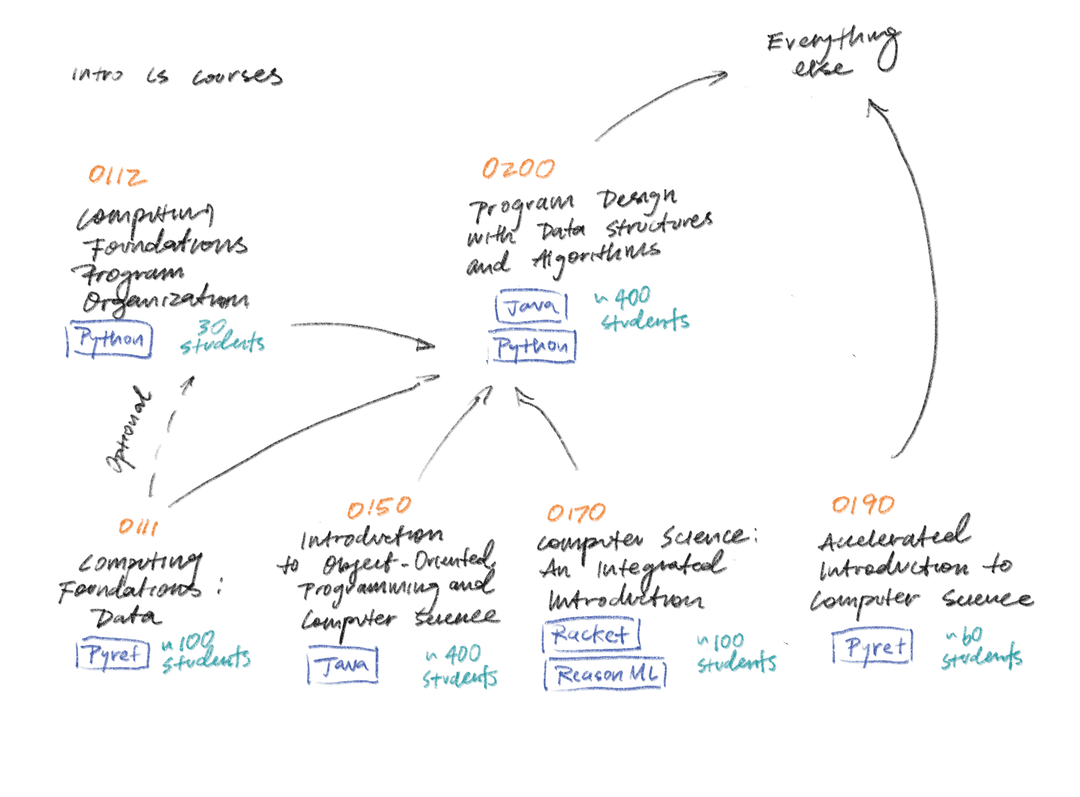
Well, I was already pretty set on taking 19 after doing the summer placement. The first person to introduce me to programming was Zed A. Shaw, who wrote Learn Python the Hard Way back in 2013. His authorial voice was very serious, very pedantic, and somewhat sarcastic. I think the professor of 19 gave me the same impression. You don't really have that sort of voice unless you care very much about your teaching.
19 was a small class with a few partner projects, so I knew most of my classmates and made close friends. The professor was also—truly—the best lecturer I have ever had. I can say a lot more about this class, so if you are thinking about 19, please feel free to reach out.1
CSCI 1450 Introduction to Probability ❤️
At that time, I was also impatient to get one of my math prerequisites out of the way. After some calculation, I decided that taking probability would unlock more courses than linear algebra.2 There were three courses that fulfilled the requirement: CSCI 1450, APMA 1650, or APMA 1655. I chose CSCI 1450 fairly arbitrarily, mostly on the basis that a friend of mine was taking it. I never attended lecture—this will be a recurring theme for math courses—but CSCI 1450 actually ended up being my favorite class that semester. I have very good memories of visiting office hours every week and hanging out with the TAs and my friends. Really, I spent so much effort on this class that I regret taking it S/NC.3
CSCI 1951x Formal Proof and Verification ❤️
Coming to Brown, I also had a vague idea that I wanted to learn more about logic. I think I was trying to make an (automated) theorem-prover at the time. This led me to take CSCI 1951x, which did not have any formal prerequisites. It touched on everything from program semantics and metaprogramming to the logical foundations of mathematics. I also have very good memories of camping office hours for this course.
COST 0120 The Chinese Philosophy of Life
My last course was COST 0120. I thought it might help me solve a few existential problems I had at that time. It did not help that much, but I did learn a lot about Mengzi, Xunzi, and Zhuangzi.
Reflection
So, a brief summary of what I actually did in these courses: I went to class, skipped class, did problem sets, wrote papers, and spent a lot of time talking to my TAs.
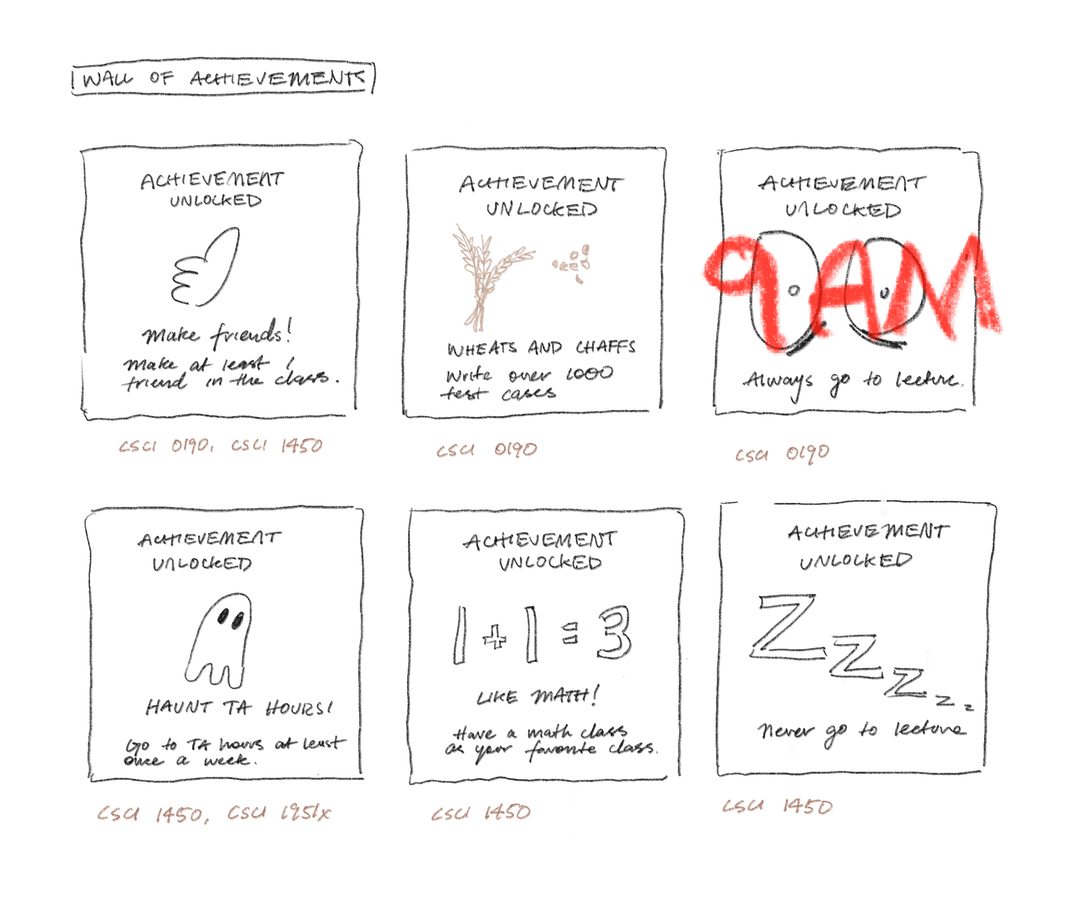
I could have, but did not, take "Introduction to Linguistics" (CLPS 0300), "Diversity of Life" (BIOL 0210), "Form and Formalism" (APMA 1920), and "Writing Graphic Memoir" (ENGL 1050U), and "Advanced Deductive Logic" (PHIL 1635). I do hold a little bit of regret for not shopping APMA 1920 and ENGL 1050U, but I was very busy with CSCI 0190 assignments at that time and missed the opportunity. Here was the full shopping list:
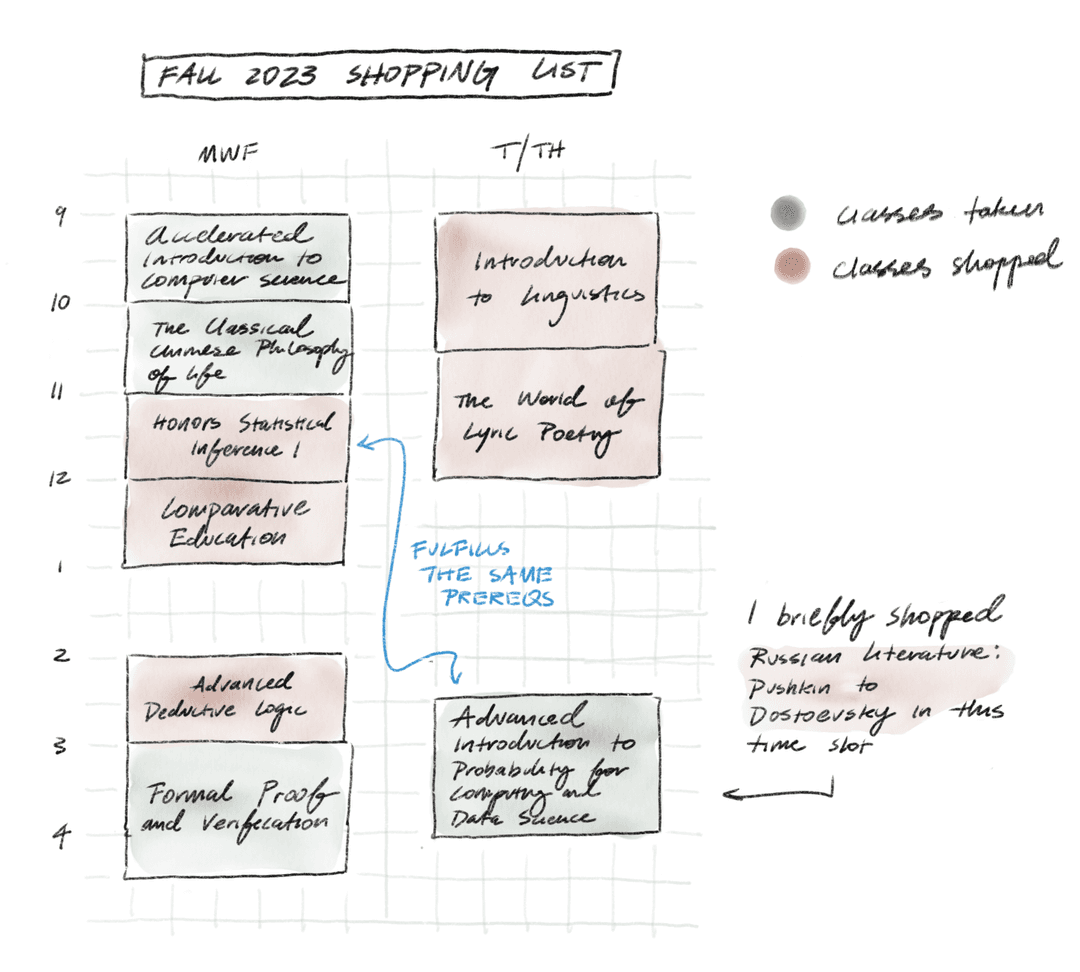
My takeaways from this semester were:
- Choose the smaller course
- Choose the more difficult course
- Choose the course with your friend
- Do more math because it's fiddly and fun
- Don't S/NC courses
(I will end up disputing points 3-5 in the future, but that's a lesson for another semester.)
Spring 2024
Context: I was a second-semester freshman who knew a little more about the world. I wanted to know whether I enjoyed systems or AI more, which I thought of as two sides of an extreme. I also thought I wanted to finally try math, logic, and linguistics. I was also working at a neuroscience lab for some reason.
CSCI 0300 Computer Systems ⭐
I always heard that CSCI 0300 is the best course ever. Well, now that I have taken it, I can become one of those people who say that CSCI 0300 is the best course ever. The professors are some of the most caring and sympathetic people around. You want that in a systems course, because systems are hard. When you're running into a segmentation fault for the nth time, you don't want hard love; you want comfort and support and understanding. I think they get that just right. Here's something I wrote about the transition from 19 to 300 a year later.
Underclassman:
for the people who've taken both 19 and 300 how did you find the latter in terms of difficulty as opposed to 19?
Me:
conceptually around the same difficulty, but 19 and 300 are almost like the antithesis of each other. some things i can point out:
- pyret is functional and C/C++ is not. it's probably easier to pick up imperative after learning functional programming, but that does mean that some things don't transfer. after a few segmentation faults, you'll understand why ideas like "immutable by default" comes about
- you will need to pick up some tooling. by tooling, i mean getting comfortable with your editor (vscode, vim, emacs) and its keyboard shortcuts and with the terminal. the pyret editor is very simple. this is fine because 19 assignments are small and usually contained within a single file. for 300 projects, you'll want to be able to quickly open multiple files at a time and also have gdb running in the terminal. i suspect that 15/17 students might be more comfortable doing that
- 300 projects have a lot of boilerplate code. you'll have to be comfortable with reading and extending code that you have not written yourself. you don't really learn this in 19 because you write all of the code and design all of the data structures yourself. (data-driven programming is amazing, it's just not that useful in 300 because of how structured assignments are)
it is because they are so different that i usually recommend everyone in 19 to take 300 afterward. learning a memory-unsafe language really concretizes how ideas in modern programming languages came about. i would also argue that the only way to really learn software development is by thinking about how a complex system works. good coding practices (which you learned in 19, and you'll learn more of in 320) comes afterward
CSCI 1470 Deep Learning
I took CSCI 1470 because all of my friends were taking it. I did not enjoy it as much as CSCI 0300. I think it faces a very classic problem: the professor teaching it changes every semester, so institutional knowledge does not get passed down, and the course never improves. This is different from CSCI 0190, CSCI 0300, and CSCI 1951x, which are taught by the same professor every year.
Of course, I can't just blame the course structure. I think I'm also just not interested in AI/ML. Some existential thoughts here. In fact, the only part of this course I truly enjoyed was the final project, where I spent three straight days chugging Monsters, debugging legacy Tensorflow v2 code, and spiraling between "it's joever" and "we're so back" with my teammates.
MATH 0540 Linear Algebra
Abiding by the lessons I learned last semester, I chose MATH 0540 with the thought that it was (1) a small class, (2) a difficult class, and (3) a class with my friend and (4) a math class.
MATH 0540 probably would have been a great choice, if I didn't also decide to take PHIL 1665 with another friend.
PHIL 1665 Modal Logic
PHIL 1665 spun my brain around well enough that I'm afraid of taking another analytic philosophy class again.
I never truly understood the modal ideas of necessity and possibility. And it became especially hairy when they added in first-order logic, like forall and exists.
CLPS 0800 Language and the Mind
CLPS 0800 is a pretty good WRIT course, but I realized that I wasn't that passionate about psycholinguistics or clinical research.
Reflection
A brief summary of what I actually did in these courses: I went to class, skipped class, did problem sets, did more problem sets, did so many problem sets, and did not have the time to go to TA hours. There are no achievements for this semester, because I was in the trenches.
My takeaways from this semester were:
- There is a limit to how much math you do before you start to miss coding. That limit is 16 hours.
- You should not take too many math classes in a semester.
- Not lying to yourself about what you like and dislike is very important. While I had suspected that I was not that passionate about linguistics, AI, or philosophical logic, I did not anticipate how burdensome those courses would be.
- I can work at least 40 hours per week on coursework, but I won't enjoy it, I won't learn as much, and there will be the threat of burnout lurking in the background.
- The difference between magic and boringness is possibly not the content, but the professor.
But now that I look back on it, I didn't have any particularly good alternatives either. I'll just take a better workload next semester.
Fall 2024
Context: I spent the summer working in a psycholinguistics lab and finally admitted that computer science was the only thing for me. My professor encouraged me to try computer science research.
CSCI 1680 Computer Networks ⭐
When anyone asks me for course recommendations, I always tell them to take CSCI 0190 first and then CSCI 0300. But my favorite course at Brown is most definitely CSCI 1680.
- There is no stencil code. You write everything from scratch. You know the codebase intimately. Your design decisions matter.
- You can choose to do the project in C, C++, or Rust. This course made Rust finally click for me.
- The two major projects, IP and TCP, are built on top of each other. This encourages you to write clean and maintainable code.
- IP, TCP, and the final project are also partner projects! You learn to communicate with your partner, and you learn to read and extend code that you have not written yourself.
The workload is fairly high, and I would recommend clearing out your schedule for it, especially if you decide to not do the projects in Go. Here was my breakdown, including time spent watching gearups:
| Assignment | Time to complete |
|---|---|
| Snowcast | 36.5 hours |
| IP | 38 hours (personal), ~60 hours (group) |
| TCP | 52 hours (personal), ~100 hours (group) |
Total: 36.5 + 38 + 52 = 126.5
CSCI 2952r Systems Transforming Systems
CSCI 2952R is a course on systems research and scientific communication. The specific focus was on systems that could improve other systems. It was quite good; I learned about the entire paper-writing pipeline and heard about tons of cool systems topics.
CSCI 1970 Individual Independent Study
My independent study course, CSCI 1970, was also tied to the research project I was doing in CSCI 2952R. I was in charge of writing the Lean code to prove some correctness properties about automatically synthesized aggregators.
MATH 1530 Abstract Algebra
I wasn't originally planning on taking MATH 1530, but (1) I really enjoyed the first lecture by one of the professors, and (2) I thought I should probably learn about abstract algebra at some point.
Unfortunately, my friends were in another section with another professor, so I switched over. And then they ditched me to take Computer Graphics instead! (This is the last time I'm blindly following my friends with course choices. It never works out.)
I found MATH 1530 to be challenging and existentially abstract, so I think it's going to be a while before I take another pure math course.
EGYT 1310 Middle Egyptian I
I remembered that Red from Overly Sarcastic Productions once said that she took a course on Egyptian hieroglyphs in college. Also, I saw a news article on one of the department monitors about an alumn who worked on deciphering dead languages. It seems like that was enough subliminal advertising for me to want to take EGYT 1310. It was quite interesting, would recommend.
Reflection
A brief summary of what I actually did in these courses: I spent an upwards of 40 hours/week coding and somehow managed to fit in other things in-between. Then I dealt with my CS-burnout during winter break.
My takeaways from this semester were:
- I like systems.
- No more pure math.
- Research is quite stressful, no matter the field.
In high school, I was very curious about a lot of things. I still believe that there is a high marginal benefit to dipping your toes into a wide range of fields and taking away the most important ideas and models.
But the fact of the matter, at least at Brown, is that there are no longer any survey courses. I checked. We don't have a World History course; it's always something like "The Age of Revolutions, 1760-1824" or "Japan's Pacific War: 1937-1945." These are good courses if you really care about the topic, but they are not very suitable for the casual passerby.
To be clear, I think Brown's Open Curriculum is very good at combatting this phenomenon. I have never taken a course that I wasn't the slightest interested in. But I do find my scope of interests narrowing quite a bit, despite my best efforts. Maybe because my first impression of these topics come from drinking from the water hose, I am not that curious about math, philosophy, or linguistics anymore.
Maybe that's just what happens when you get older. You are less confused, and your preferences become clear to you.
Spring 2025
Context: I was pretty burnt out after the fall semester. My advisor was trying to talk me into taking 1 or even (gasp) no CS classes. I told her that I would try my best and would up taking 2.5 classes.
Unlike previous semesters, I wasn't sure about my schedule at all. Reflecting back on my decisions in the past, there were usually very shallow reasons for taking or not taking a course. I would take course A because my friend was taking it or I would reject course B because it was held in a dusty classroom. Well, this was even more true this semester. All I learned to do was ruthlessly prune classes that I wasn't enjoying at the start of shopping period.
CSCI 1670/1690 Operating Systems
I took CSCI 1670/1690 because all of my friends were taking it. Plus, CSCI 1670 is taught in C, and I was TAing CSCI 0300, which is in C, which made me feel like there's a good kind of synergy there. (I told you, the reasoning was not very sophisticated.) This whole thing was not a easy choice for me though, because I knew that if I waited two more years, it would be taught by a really great professor.
I think, at the end of the day, I didn't like it. I'll tell you what you need to know if you're thinking about taking the course:
- You won't become a better programmer, like you would in 1680. There's no design element to it; it's all about following the instructions as best as you can. Maybe you learn a bit about reading complex codebases.
- Debugging what you wrote is basically all of the effort. You'll become well-acquainted with GDB. You'll figure out what your limits are before you throw in the hat and call a friend for help.
- Did I emphasize the fact that you're mostly reading other people's code and trying to figure out what they want you to write enough? The abstractions get pretty ridiculous. Like, check out this call stack for
proc_kill_all.
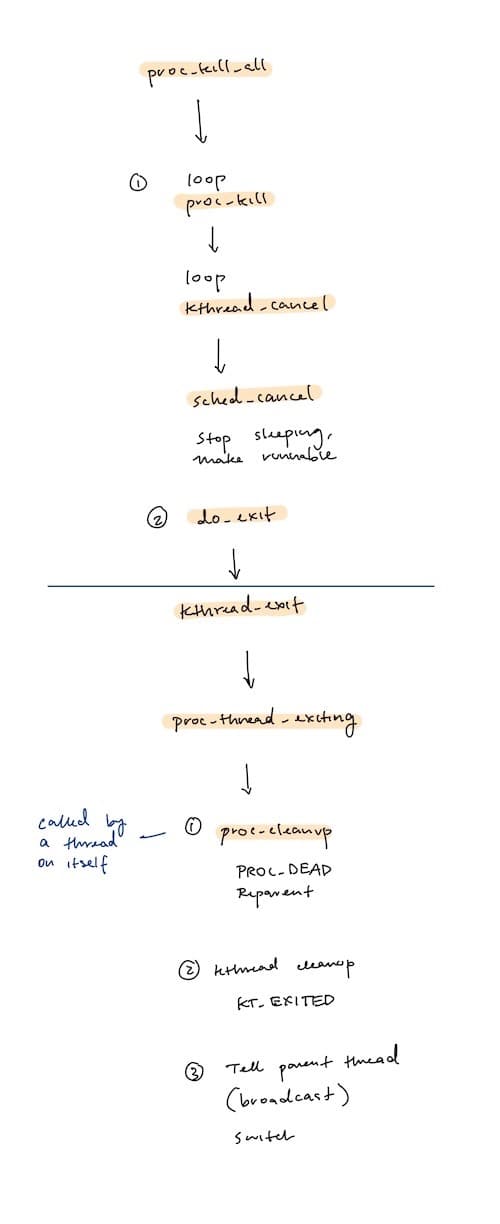
CSCI 1515 Applied Cryptography ❤️
I was originally planning on taking CHIN 1010 ("Stories from the Chinese Empire: Scholars, Demons and Swindlers"), but I changed my mind two days before the end of shopping period. After scrambling to find a CS course, I recalled that one of my friends really liked Applied Cryptography. In the end, I am glad I took it over Computer Security or Data Science.
One of my main takeaways was how to think at the right level of abstraction. On a high level, you have to think about how you would combine primitives (like homomorphic encryption and blind signatures) together to in an application (like a voting system). But on a low level, you have to think about how to actually construct these primitives. That's all the math.
Also, the professor puts a lot of care into making sure we understand lecture, and her passion is infectious. Some courses leave you with the impression that the field is awfully boring and unmotivated. Not 1515. Hashing is actually, like, magical. Do you know how many things you can do with it? You can make signatures, pseudorandom generators, non-interactive proofs, commitments...
It's all super exciting, even though it's never going to be my main thing. Highly recommend.
ENGN 0520 Electrical Circuits and Signals ❤️
I really did not expect to take ENGN 0520. I only decided to shop it because my friend was taking it, and I had a free slot in my schedule. But the first lecture was very good, and it reignited that curiosity I also had toward electronics and hardware. I have had some experience with it in my high school physics class, but I never felt like I really knew how circuits worked. I also thought ENGN 0520 could also solve some existential problems I have about "what is real" and whatnot.
Well the problem was: I discovered I didn't remember how to do math anymore.
Like, real math.
In my previous math classes, we just had to write words. ENGN 0520 required a kind of numeracy that you better have when you're armed with only a pencil and a piece of paper.
There are actually a lot of practical considerations, like:
- When should you round?
- Where should you round to?
- When should you include units?
- How do you show your work?
- How much of your work should you show?
I think I totally got clobbered by the two midterms. Definitely below median (and the median was 50%). It took me until the final exam to lock in and relearn everything I had forgotten.
I am going to give a special thank you to the ENGN friend for helping me study even when I was a below-average student for most of the course, and they were setting the high score on every exam.
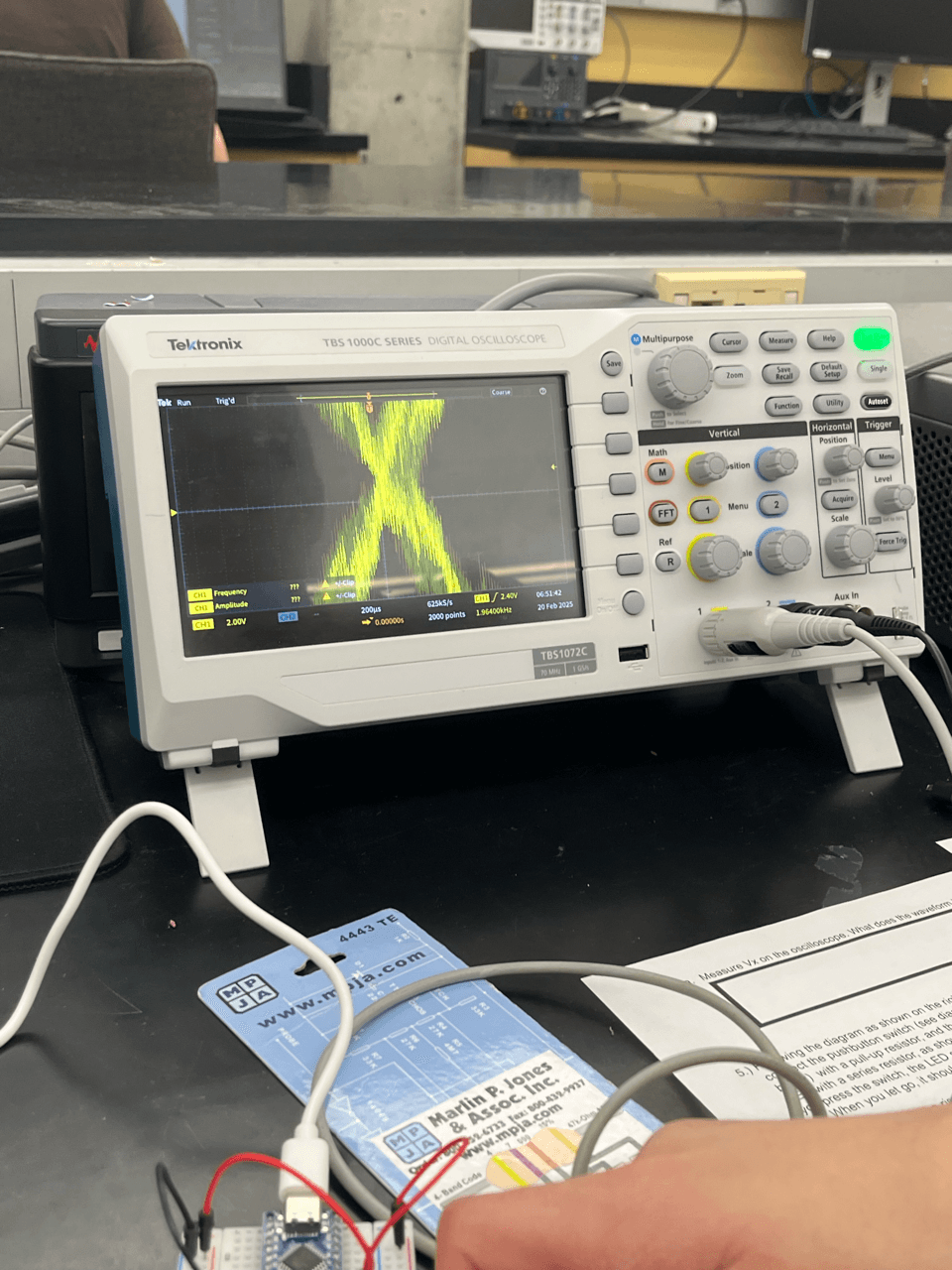
(The lab part was great too, but I was totally relying on my friend to handle the oscilloscope.)
EGYT 1320 Middle Egyptian II
Finally, I continued learning Middle Egyptian in EGYT 1320. There was a lot more grammar and vocabulary to learn than I expected, so I'm glad I'm not taking it alongside CHIN 1010.
Reflection
It has been a pretty good semester. I didn't work too hard or worry too much. I found the time for my courses, my jobs, and puzzle club. I only dealt with like... 2 days of burnout after the semester ended, and that was for some other reasons.
But I do wish—at least for next semester—that I spend more time with my friends, more time developing as a person, and more time outdoors. My doctor says I'm deficient in Vitamin D.
Fall 2025
CSCI 1650 Software Security and Exploitation
The first assignment is due mid-October.
| Assignment | Time to complete |
|---|---|
| CTF-1 | 11.5 hours |
| CTF-2 | 5 hours |
| CTF-3 | |
| CTF-4 |
CSCI 1951Q Topics in Programming Languages
CSCI 1951Q has both CSCI 1260 (Compilers) and CSCI 1730 (Programming Languages) as a prerequisite. I have taken neither of these courses, so taking this course feels like getting a two-for-one deal.
| Assignment | Time to complete |
|---|---|
| Warmup | 18 hours |
| Type Inference | 20 hours |
| Dataflow Analysis | 35.5 hours |
| Flows | 37.5 hours |
Dynamism |
Total hours and counting: 18 + 20 + 35.5 + 37.5 = 111 hours.
CSCI 2690 Datacenter and Cloud Operating Systems
Very well-organized. For example, the IX paper (9/16) references the the Dune paper (9/11), the Exokernel paper (9/11), and also mentions multicore scaling, which is addressed heavily in the Multikernel paper (9/9). The professor selects both papers that are very relevent, and papers with obvious flaws, and makes us think deeply about whether the findings were valid and useful. I feel like I am getting a guided tour through the literature of operating systems.
ENGN 1630
So far, it has covered the same material as ENGN 0520.
BIOL 0210 ⭐
Really amazing lectures. The professor talks at a great pace and is great at emphasizing what is important. I know a bunch of disparate facts about ancient life from doing the fossils event in Science Olympiad, but this class really helped me piece together the bigger image.
Links
If you're looking for more course suggestions, here are some write-ups from [1] [2] [3].
Here is some advice I found helpful:
- College advice for people who are exactly like me is not about choosing courses, but about all of the other things you can do in college when you're not choosing courses.
- Bluebooking for happiness argues that only the professor matters when it comes to a good course.